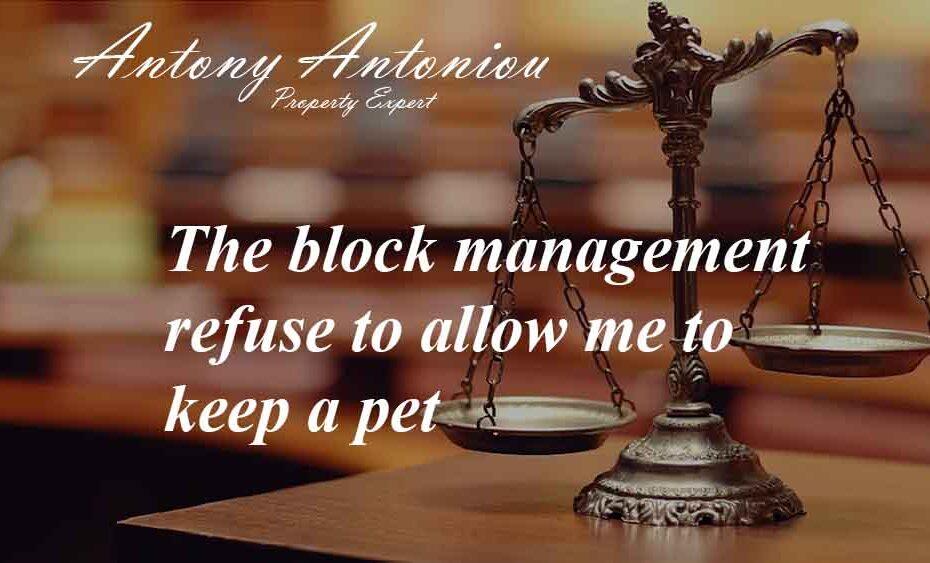The block management refuse to allow me to keep a pet
Can You Keep a Pet in Your apartment? The Complexities of Pet Ownership in Shared Buildings
Living in a historic converted Georgian building undoubtedly offers charm and character, but it also comes with its fair share of challenges, especially when it comes to navigating the rules and regulations set by the management company. One of the most contentious issues that can arise in such shared living spaces is pet ownership. In this blog post, we’ll delve into the intricacies of whether your building can stop you from having a pet, exploring a recent scenario involving a management company, directors, and a lease clause.
The Pet Predicament: A Lease Dilemma
Imagine this scenario: You live in a beautifully restored Georgian building and play a pivotal role as one of the directors on the management company’s board. The management company holds the freehold and manages the entire estate. Here’s where the conflict arises – a disagreement among directors regarding pet ownership.
The lease agreement governing the property states, “No pets of any nature whatsoever including dogs, cats, caged birds, reptiles, domestic or non-domestic animals shall be kept upon the Flat or the Garage or any part of the estate without the landlord’s written consent first being obtained.”
While the language of the clause seems to allow the board some discretion, most directors stand against having pets on the estate. They are proposing to communicate with shareholders that “no future consent to keep pets will be granted by this Board.” However, one director (let’s call them the Pet Advocate) disagrees vehemently with this proposal, although they anticipate being outnumbered in the vote.
Seeking Clarity: Deciphering Lease Wording and Legal Implications
The question at hand is whether the board has the right to make a sweeping statement that seemingly negates the discretionary power granted by the lease clause. Should the board be allowed to put a blanket ban on pets, or is there more nuance to the situation?
Legally, in cases where obtaining consent is necessary, that consent cannot be unreasonably withheld. This principle applies to many legal contexts, including leases. Therefore, if the management company were to adopt a policy that systematically denied pet ownership without considering individual circumstances, it could potentially be challenged.
While it might seem straightforward to adopt a policy against pets, especially given the potential for nuisances like noise and damage, each case should ideally be evaluated on its own merits. Blanket policies may not fully address the diverse range of pets and situations that could arise.
Balancing Act: Factors to Consider
As the management company navigates the delicate waters of pet ownership, several considerations come into play:
1. **Reasonableness**: When evaluating pet ownership applications, it’s important to assess the reasonableness of the request. While a large dog might not be suitable for a small apartment, a smaller pet like a fish might pose minimal inconvenience.
2. **Potential Nuisances**: The primary concern of the no-pet clause is likely to prevent nuisances like excessive noise and damage to common areas. When reviewing applications, potential risks to the harmony of the community should be at the forefront.
3. **Individualized Approaches**: As demonstrated by the scenario of requiring a deposit for potential damages, a case-by-case approach might prove to be more effective in addressing concerns associated with pets.
Conclusion: Finding a Middle Ground
In the complex landscape of shared living spaces, pet ownership can be a contentious topic. While management companies and boards have the authority to regulate pet ownership to maintain the quality of life for all residents, adopting a one-size-fits-all policy might not be the most effective approach. Instead, a balanced and case-specific evaluation process could help strike a fair compromise between pet enthusiasts and those concerned about potential nuisances.
As the scenario of the Georgian building illustrates, the interplay between lease clauses, board decisions, and legal principles can be intricate. Whether you’re a director, a resident, or a pet lover, understanding these complexities can empower you to advocate for fair and reasonable solutions that benefit the entire community.

